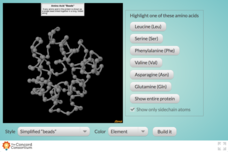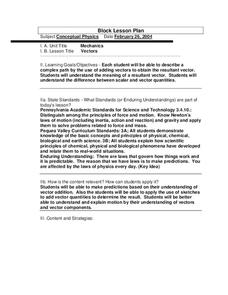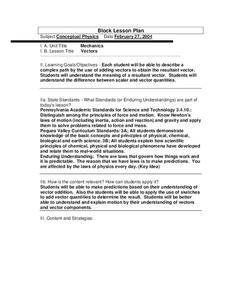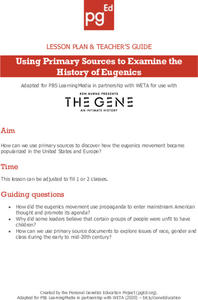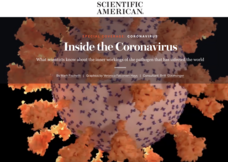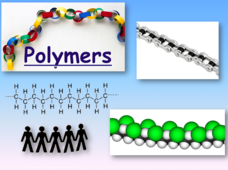Curated OER
It Counts
Students classify and compare plants using specific information, observations, and numbers. In this mathematical inquiry instructional activity, students use plant characteristics to describe, compare, and classify them. They attempt to...
Virginia Department of Education
The Modern Model of Atomic Structure
The difference between atomic mass and atomic number can be confusing for some young chemists. Help your class better understand the concepts by allowing them to sketch an atom on paper and then discuss their experience. Upon completion...
Institute of Electrical and Electronics Engineers
Exploring at the Nanoscale
Nano-nano! Nanotechnology can seem like it's from another planet! After learning about this tiny technology, collaborative groups experiment with how smaller particles affect chemical reactions. They do this by immersing a whole and a...
Curated OER
The Building Blocks
This PowerPoint is a comprehensive review of all the facts related to an atom's basic structure and function. What makes this unique is that it is geared toward an audience of junior geologists. After introducing the periodic table of...
Serendip
Understanding and Predicting Changes in Population Size – Exponential and Logistic Population Growth Models vs. Complex Reality
Salmonella poisoning impacts over 200,000 people in the United States each year. Scholars learn about the growth of these bacteria using multiple approaches. Then they apply the same growth calculations to endangered species and think...
Purdue University
Simple Machines
What's the best way to use a simple machine to solve a real-world problem? Scholars construct their own simple and complex machines to explore the concepts of work and force. They discuss examples of simple machines they have found in...
Concord Consortium
Exploring Protein 3D Structure
Presenting protein structure can be difficult! Take young biologists on a 3-D amino acid adventure with a detailed interactive. Pupils view and manipulate common amino acids individually or as a part of a whole protein. Choose from three...
Smithsonian Institution
Trait Tracker
Help mice beat the odds with an exciting activity about traits. Biologists discover the role of diet and other factors on animal traits by participating in a simulation activity. Teams collect and evaluate data to understand how certain...
It's About Time
Who Eats Whom?
Packed with visual aids and multiple learning opportunities, an engaging exercise challenges individuals as they explore the role of producers, consumers, and decomposers. After discussing differences between food chains, food...
Curated OER
Sample Midyear Examination (Chemistry and Biology)
A 12-page midterm exam sample can be given to young scientists in preparation for an exam. This particular installment is geared toward a class that delves into both ecology and chemistry concepts. There is no way to separate the 50...
Curated OER
Vectors
Students describe a complex path by the use of adding vectors. They comprehend the difference betwee scalar and vector quanitities. Students disucss the naviagation lab. They are explained the procedures for the lab. Students are...
Curated OER
Vectors
Students describe a complex path by the use of adding vectors. They are explained the procedures and rules of the balloon car race. Students are remined that the summary and answers to the questions are due Monday. They are given the...
Curated OER
Reptile and Amphibian Anatomy
Students identify and interpret the various differences between reptiles and amphibians. Then they draw an amphibian and reptile and correctly label their body parts. Students also invent new reptiles and amphibians, sketch how they...
Institute for Energy and Environmental Research
Practice with Scientific Notation
Zeroes are more important than they look! A guided practice activity takes learners through the process of both scientific and decimal notation, culminating in more complex word problems and equations.
It's About Time
Chemical Names and Formulas
Abracadabra! Provide your class with the tools to perform a chemical "magic show" as they predict the charges of various ions, determine ionic compound formulas, and make observations to determine when a chemical reaction between...
University of Wisconsin
Designing a Rain Garden
Now it's time for all of the data collected in previous lessons to be applied to the design of a rain garden. This resource can only be used as part of the greater whole, since learners will need to rely on gathered knowledge in order to...
Personal Genetics Education Project
Using Primary Sources to Examine the History of Eugenics
Eugenics philosophy takes survival of the fittest to a whole new level. With a research-focused lesson, young scientists examine the history of the eugenics movement and its impact on society. Pupils engage with a video clip, primary...
Scientific American
Inside the Coronavirus
Take biologists on a journey into the heart of the Covid-19 virus with a series of stunning graphics and explanations about the global pandemic. Animations bring investigators up close to the virus, revealing its structure and movement...
Royal Society of Chemistry
Periodic Table 2
While the periodic table looks complex, it is really arranged by only two variables, atomic number and electron configuration. The set of four puzzles focuses on groups 3, 4, 5, and 6 or 13, 14, 15, and 16, depending on your periodic...
Royal Society of Chemistry
Vanadium
Introduce your chemistry scholars to the periodic table's Goddess of Beauty! Through an interactive that highlights the transition metal vanadium, learners discover the colors produced in solution as vanadium changes oxidation state....
Curated OER
Ready, Set, Let's Dough! It's a Matter of System
Students will look at a complex system when they create their own play dough by taking several parts and creating a whole. The students will construct understanding that individual parts are used to make a whole.
Curated OER
Teaching Neuro-anatomy Through Schematic Diagrams
Students develop a deeper understanding of the brain. In this neuro-anatomyl lesson plan, students will use simple diagrams to understand the brain and will progress to more complex diagrams as they gain understanding.
Alabama Learning Exchange (ALEX)
Use Simple Machines to Help Stuart Little
Third graders study six simple machines while working in expert groups. They use the information from the research to decide which simple machine the Littles could use to move a package. They demonstrate how their simple machine works in...
Science Geek
Polymers
A pirate's favorite amino acid is Arrrrginine! Presentation begins with the difference between a monomer and a polymer. Then it applies that to carbohydrates and proteins and ends with DNA and plastics. Presentation is the last in a...
Other popular searches
- Imaginary Complex Numbers
- Algebra Complex Numbers
- Algebra 2 Complex Numbers
- Classifying Complex Numbers
- Complex Numbers Table
- Trigonometry Complex Numbers
- Equations Complex Numbers
- Converting Complex Numbers
- Sum of Complex Numbers
- What Are Complex Numbers
- Roots of Complex Numbers
- Precalculus Complex Numbers






